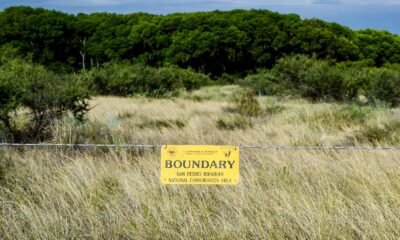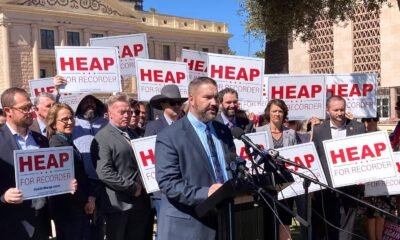arizona
‘Unborn Human Being’ Remains Key Term in Controversial Abortion Rights Initiative for Arizona Voters

The Arizona Supreme Court has mandated that the term “unborn human being” be included in the description of an abortion rights initiative, according to a split decision issued on Wednesday. This ruling overturns an earlier decision made by a trial court.
The initiative, known as the Arizona Abortion Access Act, faced legal challenges initiated by its proponents earlier this year. They argued that the phrase used in the summary, approved by a Republican-led legislative committee, was not neutral.
Arizona for Abortion Access contended that the term should be replaced with “fetus” to reflect a more medically accurate and impartial language. State law obliges the legislature to provide a description for each ballot measure, ensuring an impartial analysis of the proposal’s implications. The campaign argued that “unborn human being” was inherently partisan.
In a ruling from July, Maricopa County Superior Court Judge Christopher Whitten sided with the campaign, stating that the term carried emotional weight for both supporters and opponents of abortion. His decision prompted the legislative body to remove the controversial language from the voter pamphlet.
However, the Arizona Supreme Court reversed this decision, allowing the inclusion of “unborn human being” in the upcoming pamphlet. While the court did not elaborate on its reasoning immediately, it affirmed the stance taken by the Republican members of the legislative council during the trial.
These members argued that since the phrase is a direct quotation from existing state law, which limits abortion to 15 weeks, it was appropriate for inclusion. Vice Chief Justice John Lopez noted that the analysis met the requirements of state law concerning impartiality.
If approved, the Arizona Abortion Access Act would protect abortion rights in the state Constitution until around 24 weeks of gestation, effectively nullifying the current 15-week limit. The proposal also allows exemptions for operations performed beyond this period if deemed necessary to protect a woman’s health.
In response to the ruling, Arizona for Abortion Access expressed strong disappointment, stating that the phrase represents a biased viewpoint shaped by anti-abortion advocates rather than being grounded in medical reality.
The Secretary of State’s Office confirmed that the initiative has successfully gathered over 820,000 signatures, surpassing the nearly 384,000 required to qualify for the ballot. Advocacy group Reproductive Freedom for All Arizona criticized the court’s decision as reckless, claiming it would mislead voters.
Athena Salman, an advocate from the group, condemned the terminology as an attempt to muddle the discourse on abortion rights. “No matter what type of dirty tricks they try to pull to slow down our momentum, we know Arizonans will show up and vote for their freedoms this November,” she declared.
Justice Clint Bolick recused himself from deliberations due to a conflict of interest involving his wife, who is a member of the legislative council. He was replaced by John Pelander, a retired state Supreme Court Justice.
Two justices, Chief Justice Ann Scott Timmer and Justice James Beene, voiced their dissent, siding with the lower court’s initial ruling. Meanwhile, the Supreme Court is set to rule on another appeal from the anti-abortion group Right to Life Arizona, which seeks to bar the initiative from the ballot, citing misleading descriptions provided to voters during the signature-gathering phase. A decision is expected by August 22, coinciding with the upcoming ballot printing deadline.

















